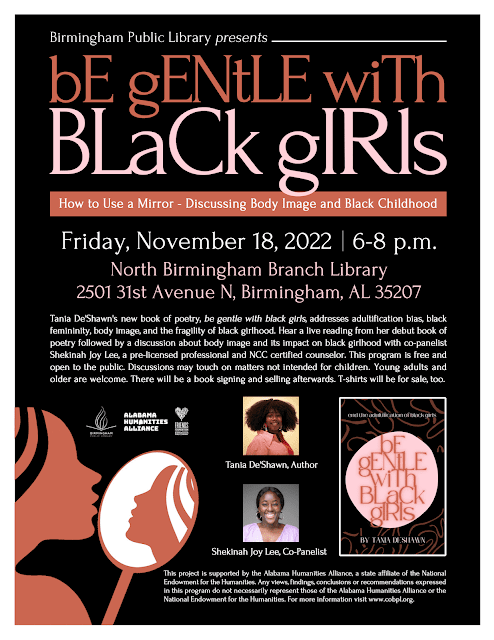North Birmingham Regional Branch Library Hosts Author Tania De'Shawn For "be gentle with black girls" Discussing Body Image, Friday, November 18
Local author Tania De'Shawn is bringing be gentle with black girls to the North Birmingham community on Friday, November 18, 6:00—8:00 p.m., at the North Birmingham Regional Branch Library for a discussion about body image.
De'Shawn's first program addressed adultification bias and black childhood. Now, her and her co-panelist Shekinah Joy Lee, a pre-licensed professional therapist, are discussing a new topic "How to Use a Mirror—Discussing Body Image and Black Childhood"
- What: be gentle with black girls: How to Use a Mirror—Discussing Body Image and Black Childhood
- When: Friday, November 18 | 6:00—8:00 p.m.
- Where: North Birmingham Regional Branch Library | 2501 31st Avenue N, Birmingham, AL 35207
- Details: Local author Tania De'Shawn will give a live reading from her book of poetry be gentle with black girls, followed by a discussion about body image with her co-panelist Shekinah Joy Lee, a pre-licensed professional therapist and NCC certified counselor. This program is intended for young adults and older and is free and open to the public. T-shirts and copies of her book will be available for purchase and there will be a book signing afterwards.
De'Shawn was recently a speaker at the 2022 Local Authors Expo and has been a part of Pen America Birmingham's Birmingham Reads city-wide book club. She will lead an upcoming book club discussion on the value of southern colloquialisms at the O'Neal Library in December. Despite a busy schedule, De'Shawn found time to sit with the Birmingham Public Library (BPL) and give more insight into her upcoming program in a short Q&A.
BPL: Could you tell us more about this program and how it came to be?
De'Shawn: This program came to be out of my desire to have in-person conversations surrounding body image. I believe that there is a myth that women of color are believed to be immune to experiencing body image problems outside of issues of texturism and colorism. We always talk about how eurocentrism affects our view of our hair and skin color but not have that affects our view of our [whole] bodies. Remove the mask of false confidence and start to heal through vulnerable conversations and writing poetry.
BPL: Is this discussion a continuation of your last program? If so, how is this program building off of the last one?
De'Shawn: This event will be a deep dive into topics we had in the last program [discussing adultification bias]. We will have a deeper conversation about how adultification bias disrupts the positive relationship that we have with our bodies and how we can recover.
BPL: Why do you think that this is an important conversation to have, especially in regard to black childhood?
De'Shawn: We live through life from the way we perceive ourselves. Having a strong realistic perception of who we are gives us the ability to know who we are, what we deserve, and what we are capable of. So often black children are limited because of [our] skin color but also by the shape and size of our bodies. Black children with bigger bodies might be [viewed as] care takers or be treated as "mammies"; children with curvy bodies might be hypersexualized and treated as "jezebels"; and children who are expressive, especially with how they use their bodies, such as hand gestures or eye rolls, might be seen as "sapphires." When in truth these are all stereotypes that are projected onto our bodies and if they are not discussed, we run the risk of internalizing and not moving beyond.
BPL: Which poems from your collection do you think resonate the most with this discussion? Any other recommended reading?
De'Shawn: The poems that most directly resonate with the discussion "Fast," "Black Girls Are Perceived To Know More About Adult Things," "Puberty," "Deja Speaks of Ms. Mae's Heart," and "How To Use A Mirror." The poems really journey through hypersexualization, binging, restricting, and what it means to look at your body and understand that it truly deserves love.
Other books that I recommend reading would be: Hood Feminism: Notes from the Women That a Movement Forgot by Mikki Kendall, Perfect Black by Crystal Wilkinson, and for younger readers, The Skin I'm In by Sharon Flake.
BPL: What else would you like our readers to know about you, the program, or your book?
De'Shawn: I would like readers to know that I am passionate about bringing the discussion about body image to our community. If they are interested in brining be gentle with black girls: How To Use A Mirror discussion on body image curriculum to their school, church, or organization, they can email me at taniadeshawn@gmail.com. I would love to collaborate by creating opportunities for healing.
You can purchase a copy of her book online or at the program at the North Birmingham Library on Friday, November 18.
This project is supported by the Alabama Humanities Alliance, a state affiliate of the National Endowment for the Humanities. Any views, findings, conclusions or recommendations expressed in this program do not necessarily represent those of the Alabama Humanities Alliance or the National Endowment for the Humanities.
By Cheyenne Trujillo | Library Assistant Ⅲ, Public Relations


Comments